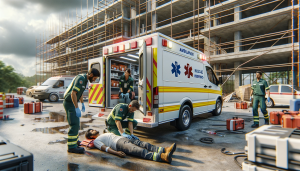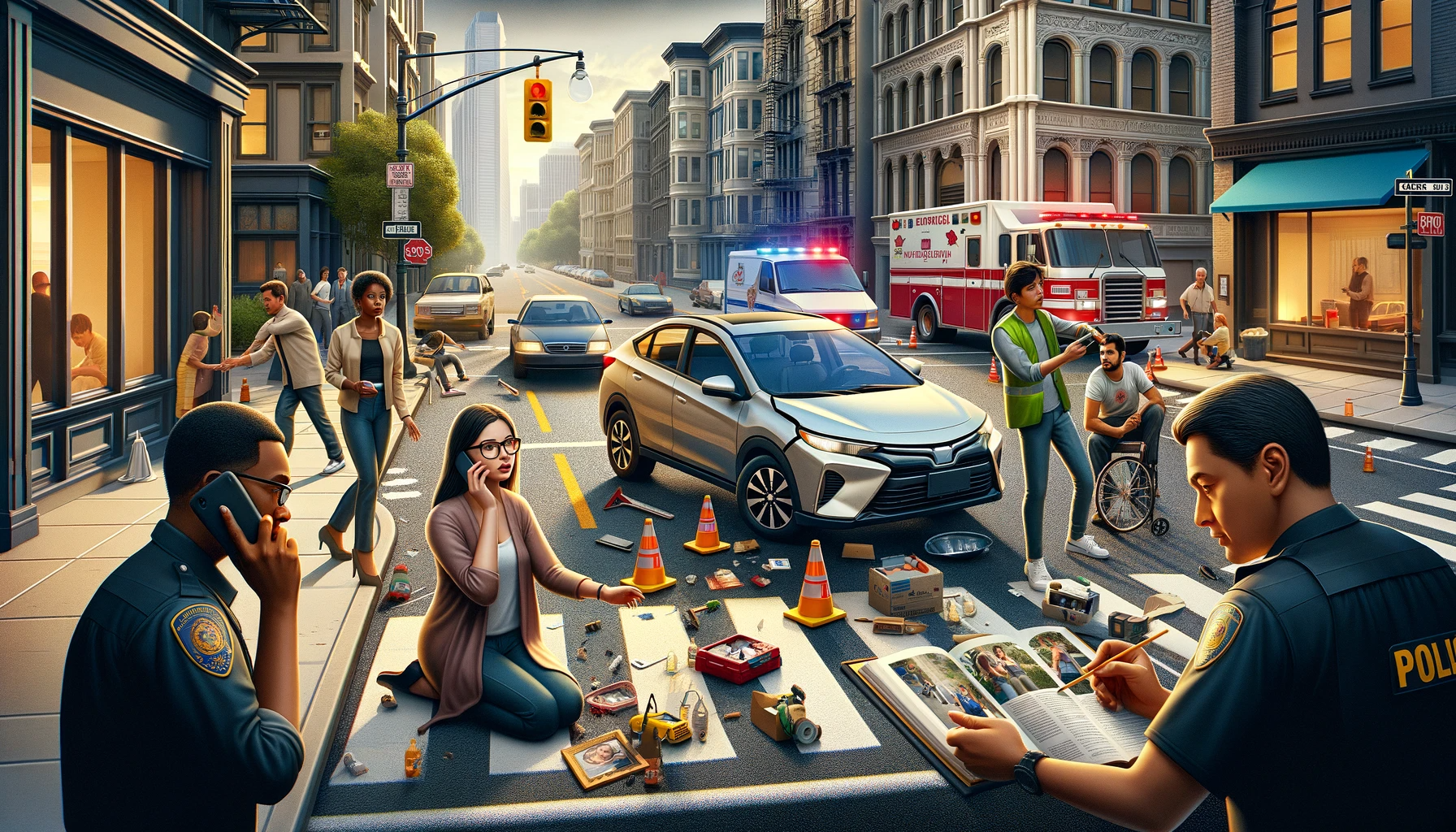Getting into a car accident can be a jarring and confusing experience. Knowing what to do in the immediate aftermath can not only ensure your safety but also help protect your legal and financial interests. Here's a comprehensive guide on handling the situation with calm and efficiency, elaborating on each step to provide you with a more in-depth understanding of the process.


Safety First: Immediate Actions After a Collision
The moments following a car crash are crucial. First and foremost, assess whether you or any passengers have sustained injuries. If anyone is hurt, it's essential to prioritize their well-being. However, it's crucial to remember not to move them unless there's an immediate danger, such as a fire. Moving an injured person without proper knowledge can exacerbate their injuries. Once you've done a quick assessment and ensured the safety of everyone involved, if the situation allows, move your vehicle to the side of the road. This step is essential to avoid further accidents and ensure the safety of all parties involved. Leaving your vehicle in the middle of the road can lead to additional collisions and potential injuries.Alerting Authorities: What to Do at the Accident Scene
Even if the accident seems minor, it's essential to call the police or local emergency services. They can provide necessary assistance, assess the situation, and create an accident report, which can be vital when dealing with insurance claims. While waiting for authorities to arrive, turn on your hazard lights to alert other drivers about the accident scene. This step helps prevent additional accidents and ensures the safety of everyone on the road.Documentation: Car Accident Checklist
Gathering accurate information and documenting the scene is critical for future reference and insurance claims. Exchange information with the other driver involved in the accident, including names, contact details, insurance information, and vehicle registration numbers. Be sure to record this information accurately and ask the other driver to do the same. Take photos of the accident scene from different angles, capturing the position of the vehicles, damage to all vehicles involved, and any relevant road signs or signals. The visual evidence can be invaluable when proving your case to insurance companies or in a potential legal dispute. In addition to photographs, jot down the details of the crash while they're fresh in your memory. Include information such as the time of the accident, weather conditions, road conditions, and any other relevant details. The more comprehensive your notes, the better you can recall the incident later.
Witnesses: Gathering Additional Information
If there were witnesses to the accident, take the time to speak to them and ask for their account of what happened. Collect their contact information, including names and phone numbers, in case their testimony is needed for insurance or legal purposes. Witness statements can provide essential unbiased perspectives on the accident, which can strengthen your case.Legal Considerations: Handling Auto Accidents
It's important to understand your rights after an accident. One crucial legal consideration is to avoid admitting fault or making statements that could be used against you later. Stick to factual information when discussing the accident with others, including the police, the other driver, and any witnesses. If necessary, consider contacting a legal professional to help navigate the situation. An experienced attorney can provide guidance on how to handle insurance claims, negotiate settlements, or pursue legal action if needed. They can also protect your rights and ensure that you don't inadvertently make statements or agreements that could harm your case.Medical Attention: Post-Accident Procedures
Even if you feel fine immediately after the accident, it's crucial to seek medical attention. Some injuries, like whiplash or internal injuries, may not be immediately apparent. Keep in mind that the adrenaline rush following an accident can mask pain and symptoms. Visit a healthcare provider to get a thorough examination, even if you believe your injuries are minor. Keep a detailed record of any medical visits and treatments related to the accident, including doctor's notes, prescriptions, and bills. This documentation will be essential for both your health and any potential insurance claims or legal actions.
Insurance: Car Accident Insurance Steps
Notify your insurance company as soon as possible after the accident. Provide them with all the gathered information, including the police report, contact information for the other driver and witnesses, and any photos or notes you have taken. Cooperate fully with their investigation and answer any questions they may have regarding the accident. Understanding the claims process can help you make informed decisions about your coverage and compensation. Your insurance company will guide you through the process, including assessing the damage to your vehicle, arranging for repairs, and handling any medical bills or property damage claims.Repairs: Dealing with Car Damage
After assessing the damage to your vehicle, it's essential to choose a reputable repair shop to handle the repairs. Contact your insurance company to understand their preferred repair shops or any specific requirements they may have. Ensure that the repair shop provides you with a detailed estimate of the repair costs and a timeline for completing the work. If you need a car while yours is being repaired, check your insurance policy for rental coverage. Many insurance policies include rental car reimbursement as part of their coverage, which can help you avoid additional expenses while your vehicle is out of commission.Follow-Up: After Car Accident Tips
In the days and weeks following the accident, it's crucial to monitor your health for any delayed symptoms. Some injuries may not manifest immediately but can develop later on. If you experience any new or worsening symptoms, seek medical attention promptly and inform your healthcare provider that the symptoms may be related to the accident. Keep all records, receipts, and correspondence related to the accident in an organized file. This includes medical bills, repair estimates and invoices, insurance claim forms, and any communication with insurance companies or legal professionals. Organizing these documents can help streamline the claims process and provide you with a clear record of all expenses and actions related to the accident.Conclusion
Experiencing a car accident can be overwhelming and stressful. However, taking these comprehensive steps can help you manage the situation effectively and protect your legal and financial interests. Remember, preparedness can make all the difference, so familiarize yourself with these guidelines before you find yourself in need of them. In conclusion, knowing what to do after a car accident is crucial for your safety and well-being, as well as for protecting your legal and financial interests. By following these detailed steps, you can navigate the aftermath of a collision with calm and efficiency, ensuring that you have all the necessary information and documentation to handle insurance claims and potential legal actions effectively. Prioritizing safety, gathering evidence, seeking medical attention, and cooperating with authorities and insurance companies are all essential aspects of post-accident procedures. By being prepared and knowledgeable, you can make a difficult situation more manageable and ensure a smoother recovery process.Look for an attorney who has the right legal resources for your legal needs.
Contact us here on the Warmuth Law website or through our hotline 888-517-9888.











